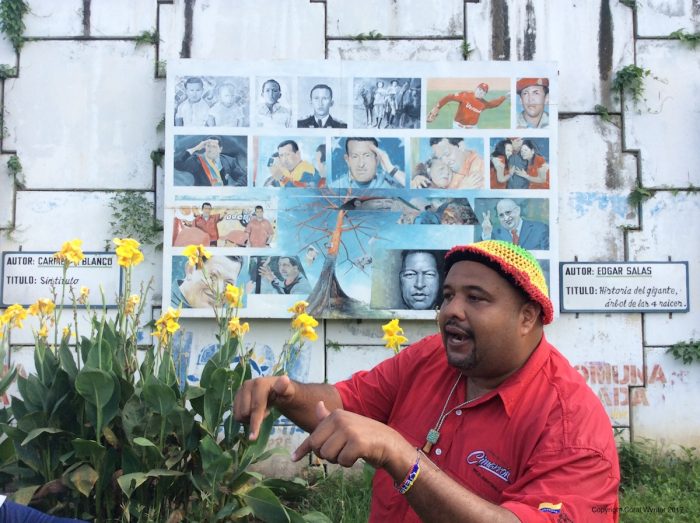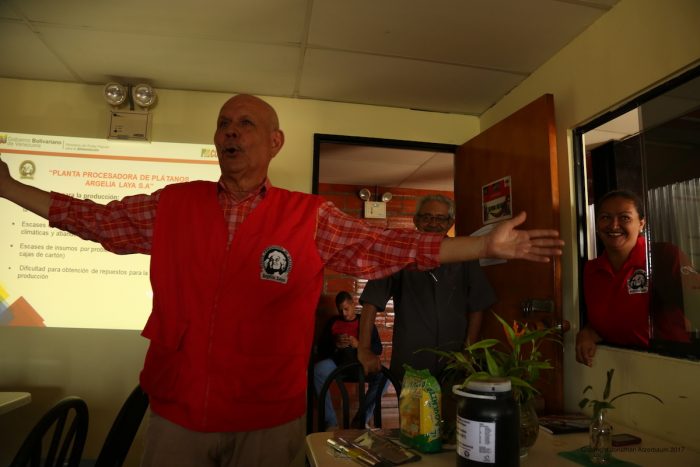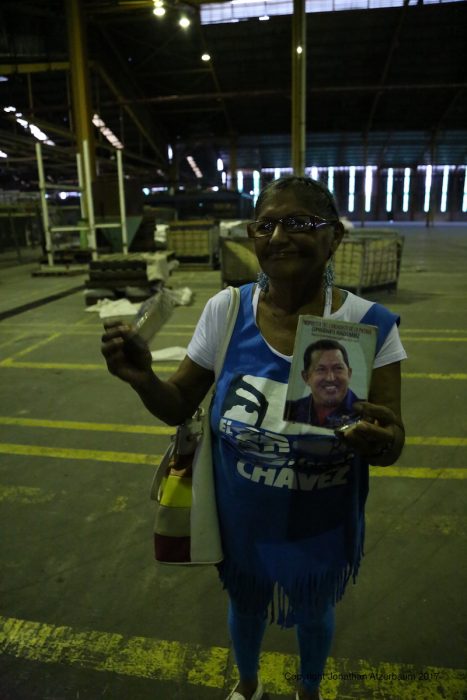A condensed version of this story was published last December here.
Venezuelans across different communities and cultures, but with generations’ worth of historical erasure and trauma, repeat a similar refrain: the Bolivarian Revolution is the only process to acknowledge us. Afro-Venezuelans, people abused on the basis of sexuality and gender, and people raised in poverty, discuss at great length how the Revolution affords them the framework to affect profound change in their own and their communities’ lives and futures, even as the process is one of inventing form and function as they build a new society. These Venezuelans possess intimate knowledge of laws establishing and protecting their rights and power, and defend the premises and charisma of their Revolution vigorously and proudly because, they say, it has given and remains their only hope.
The Bolivarian Revolution, ushered in by then-President Hugo Chávez, generally refers to the re-imagination of the Venezuelan Republic as a socialist nation, anchored by the new Bolivarian Constitution of 1999. This Constitution embraces popular power and human and civil rights, and establishes the foundations for a new national economic model based in worker ownership and social production.
Barlovento, a Historically Afro-Venezuelan Region
Barlovento, in the coastal state of Miranda that lies east of Caracas, denotes a town and the surrounding area. It has a predominantly Afro-Venezuelan population and, prior to the Revolution, it was also the most economically depressed region in the nation. Héctor Delgado, General Manager of the socialist enterprise Cacao Oderí, which includes two plants (Oderí and Cimarrón), and a proud native of Barlovento who understands himself as a product of the Revolution, ticks off his professional accomplishments: in addition to working as manager of a state enterprise, he is the first civilian enrolled in postgraduate studies at the institute of higher studies of national defense (Instituto de Altos Estudios para la Defensa Nacional), a community organizer and city council member, and a university professor.
While just 38 years old, he has lived nearly the entirety of his adult life within the 18-year span of the Bolivarian Revolution. The Bolivarian Revolution is, he asserts, “is the only process that has recognized us” as Afro-Venezuelans. Chávez, the first president to claim his Afro-Venezuelan roots, implemented a system of laws and social programs designed to institute reparations to a population that had been historically rendered invisible (the 2011 census was the first that permitted people to identify themselves as Afro-descendent), discriminated against through chronically underfunded infrastructures, which perpetuate high rates of poverty, poor health, unemployment (or underemployment), and systematically excluded, particularly at leadership levels, in State and private enterprises and cultural institutions.


Héctor Delgado (Photo by Coral Wynter)
The new economic construct, in which production and profit is designed for the purpose of social good, coupled with concrete legal and social recognition and protections, create real access for Afro-Venezuelans to jobs and to power and control in the management and planning of productive enterprises. At the Cimarrón plant in Barlovento, during a welcome and quick tour with some of the workers, Nairobi, a strategic planner, made reference to living the “sueño gigante” (giant dream) of workers who laid the blocks to the factory and are now one and the same as those who work there. Delgado described how there are always opportunities for political and technical studies and experimentation in production and distribution among workers, and how this has led to expansion into candy-making and sales.
Near the Cimarrón plant, the Argelia Lara plantain processing plant produces a line of marmalade and, while increasing production from 47.75 tons in 2010 to an estimated 198 tons by the end of 2017, is also developing numerous other products with a plantain base, ranging from flour and snacks to animal feed and fertilizer. Our guide, Héctor Ganada, when asked about the difference between a private (capitalist) and State (socialist) enterprise responded, “our production processes are the same or better than those of a private enterprise, but there are big differences in social orientation. Our profits go to the workers and community. Our community engagement ranges from providing fertilizers, insecticides, and other necessary chemicals to those who sell us plantains, to helping a grower with land title problems through the appropriate process or get necessary identity documents, to participating in all social, cultural, and sports activities in the region.”
Toward the end of our tour of the production line, pausing at a conveyor belt and table flanked by four workers placing labels on glass jars of marmalade and then nestling them into cartons, Ganada made a quick observation that further illustrated his point about social orientation: “although automated packaging machines label and box many times faster than human capacity, we will not use them because mechanization creates unemployment.”


Héctor Ganada (Photo by Jonathan Chai-Chang Atzerbaum)
ASGDRe, For Sex and Gender Diversity
Speaking more specifically to developing a social and political presence, the Alianza Sexo Género Diversa Revolucionaria (ASGDRe, the revolutionary sex-gender diverse alliance), seeks to participate in and permeate all spheres of public discourse with a sex-gender diversity lens. In the context of laws and policy, for example, members define their work as struggling for the recognition and rights of diverse families. They describe their own families of origin as not at all like the nuclear family idealized by the culture, but as extended, with lots of relatives (often women) raising children, which is also a traditionally Afro-Venezuelan formation of family. Consequently, they build linkages with Afro-Venezuelan and feminist movements and, rather than advocating for narrow policy reform like marriage equality, seek to protect myriad kinds of families.
ASDGRe members approached select delegates to the Asamblea Nacional Constituyente (ANC, the national constituent, or constitutional, assembly) with whom they share specific identities, such as campesina (rural), labor, or students. The ANC has 545 members, 364 of whom represent territories, 173 of whom represent different social sectors, and 8 of whom represent indigenous communities. Its responsibilities include legislating, strengthening popular power, and expanding and refining the Constitution in the two years it has given itself to accomplish these tasks. Delegates must shepherd their constituencies through debate, proposal development, and robust engagement in ongoing critical revisions of others’ proposals and draft ANC documents. ASDGRe seeks early entry to these processes with different groups, in order to see sex-gender diversity written in across different proposals.
Change remains slow, even now. In a separate conversation, one member, María Helena Hernández, described how during the course of petitioning various government entities for available material supports, she encounters outright hostility if the person is homophobic or religious, or her requests are simply ignored. And yet, she also asserted, “we understand the Bolivarian Revolution as the only option for us, colonization did not recognize us, nor have any of the governments since.”
“We are now part of the Constitution, laws, and politics; this cannot be denied.”
Gran Misión Vivienda, a National Plan for Housing Justice
Residents of the Gran Misión Vivienda: Oscar López Rivera describe how the Bolivarian Revolution, in providing them with safe and stable housing, has provided the means to plan and implement new projects to build food and economic security. The Gran Misión Vivienda is a national plan created by Chávez in to provide quality low- or no-cost housing to Venezuelans who are homeless, living in substandard housing, or at risk of losing their homes; to date, nearly 1.75 million homes have been completed. Some of the housing complexes include empty commercial space, intended for residents to use to create social productive enterprises that are usually subsidized by the State in the form of, for example, equipment grants or low-cost raw materials.
One such commercial space in the Oscar López Rivera housing mission incubates a sewing cooperative, formed by a group of young people with engineering, design, and performance arts backgrounds, that specializes in reusable diapers (Raúl, one of our hosts, told us that diapers were created out of necessity—”I have two little kids, diapers are expensive”). Sales of the diapers provide income for the workers and, as the business grows, cooperative members implement new ideas and projects, including creating baguette-shaped reusable shopping bags for the bakery (another Oscar López Rivera enterprise), original and custom-made women’s clothing, and Saturday workshops for people to learn how to sew using a self-teaching method designed by the cooperative members. The expanding cooperative also offers flexible schedule employment for neighbors to work during hours they are available including, for example, half-shifts in the evenings.
Raúl shared something of his own path leading to the small, brightly lit workshop where sewing machines buzzed and a compañero stepped back from a cutting table spread with pristine white fabric for bags for the bakery, in order to let us crowd in. He told us he and many others who live in these housing missions come from very poor areas, hostile environments generated by a capitalist economy. There were, he said, often open sewers running alongside their homes and university education could not have been a goal because, at the time, it was extremely expensive and generally limited to students chosen by the professors. But “Venezuela has a generation formed by Chávez,” because, according to Raúl, Chávez instituted free, holistic universal education to increase knowledge and the people’s abilities to think about social justice (“it’s about quality of life”). Raúl attended university and received a degree in design. He recognized that many young people still want to leave “because they operate out of a capitalist model” and seek wealth, cars, houses, and other things. Referencing his peers at the cooperative, Raúl stated, “our commitment as youth is to stay in the country” and contribute to the national economy.
“Those of us who understand politics are extremely grateful for the Bolivarian Revolution and for the equality of conditions, the equality of possibility. Without Chávez, I’d […] likely be cleaning toilets at McDonald’s.”
Lara, Developing Communes and Food Sovereignty
In the state of Lara at the Empresas de Producción Social Directa Comunal (EPSDC, a designation for social production enterprises owned by a commune) Proletarios Uníos, workers clearly regard the Bolivarian Revolution as liberatory, and also understand that it ultimately survives and succeeds only through their own vision and commitments. EPSDC Proletarios Uníos (united proletarians, with “uníos” spelled as it is pronounced) is an animal feed plant located at a former Brahma beer factory, originally owned by the Brazilian multinational corporation AmBev, then abandoned soon after Chávez died. AmBev was in the process of selling the factory to a Venezuelan family, who planned to fire the workers without cause (the plant was operating at nearly 90 percent capacity), hire a new, non-unionized labor force, and start over. The Brahma factory workers resisted for about two years, then entered an alliance with the Comuna Pío Tamayo (Pío Tamayo commune, Tamayo was a political activist and communist exiled, prosecuted, and eventually imprisoned and sentenced to death by the military dictator Juan Vicente Gómez) to take over the facility.
At present, the facility is under concession, a protective measure in which the State has granted permission to the Comuna Pío Tamayo to use it for agrarian production as a means of contributing to food sovereignty. Although the Comuna Pío Tamayo is prohibited from selling the facility, the concession also recognizes EPSDC Proletarios Uníos as a legal, socially owned enterprise, and the commune as its owner.


Nanci at Proletarios Uníos
Converting the plant to agrarian use remains complex and challenging. At the time of the takeover, the massive silos were filled with barley which, after the plant was inoperative for the two-plus years that culminated in the takeover, was no longer fit for human consumption. Tests indicated, however, that it could still be used for animal feed, and so ESPDC Proletarios Uníos allied with other socially owned organizations in the region to exchange barley for critical ingredients (minerals, etc.) and technical advice, and now produces three lines of feed for pigs, cattle, and chickens. ESPDC Proletarios Uníos is still working to control access to raw materials, for example, soy is a critical protein source but at the time of our visit, they had not received any from the State partner in over a month.
Consequently, they are exploring new and expanded alliances and changes to the formula to accommodate readily available, local raw materials, in order to end their dependence on imports and commerce with the State. Moreover, at this time, the plant functions at just 5 percent capacity (partly because some of its fittings, such as bottling lines for three kinds of beer containers, are simply not used) and so members of the Comuna Pío Tamayo are developing and exploring several other projects for the facility, including using an existing farm with capacity for 24,000 chickens, and distributing at low cost the drinking water available from the five underground sources.
One of our hosts, Nanci, stated that a commune is organized to assume power. She pulled from her purse well-worn copies of the 1999 Constitution and Chávez’s Plan de la Patria 2013-2019 (plan for the homeland, Chavez’s political platform for his third presidential term) and a compañero pulled copies of the Ley Orgánica de las Comunas and Ley Orgánica del Poder Popular (organic laws of communes and of popular power) from his back pocket. Both were ready to map out how communes define the means by which political and economic power is exercised and, eventually, will re-imagine and remake the State.
Another of our hosts described this is a revolutionary process only “because we’ve dared to try something (we’ve tried it all).” He noted that there have been enterprises with State leadership put in place that failed, because they continue to exploit workers, as do private owners. In the State, he said, all political tendencies still persist—some ministers support the communes, others resist because communes “will destroy the State,” and still others want to keep both the communes and private enterprise. In these ways, members of the Comuna Pío Tamayo recognize the State as distinct from the Revolution.
Another of our hosts, who goes by the nickname “Chucho,” revisited basic socialist tenets, such as that socialism is incompatible with private property as a mode of production because privatization exploits workers and resources in order to generate profit for the few owners. He also highlighted pertinent current realities in Venezuela, such as the fact that 98 percent of all enterprise is in private or State hands, which means also that 85 percent of food production is in the hands of private enterprises. Consequently, even though the commune, and therefore the enterprises it owns, are fully self-governing, they depend heavily on the State for assets ranging from simple legal recognition (a commune is legitimate, but not legal, until it registers with the State) to raw material for the EPSDC Proletarios Uníos. Chucho observed, “the bourgeois [capitalist] state is still alive and kicking,” but assessed that the system in place, while not fully serving the people, does not serve the bourgeois, either.
In the meantime, our hosts told us, they will continue building alternatives and communes, sometimes with State support, and sometimes without. In the case of EPSDC Proletarios Uníos, full expropriation of the facility is not yet complete. Expropriation is the process by which the State pays the private owner for an enterprise and assumes ownership, and then either retains it as a State enterprise, as with the cocoa and plantain factories referenced above, or transfers ownership to a commune, as would appear to be the plan with the ESPDC Proletarios Uníos, given the concession to Comuna Pío Tamayo.
The State could have, but did not, complete the transfer of ownership of the former Brahma plant to Comuna Pío Tamayo, and so the legal boundaries are still not fully defined. Chucho mused that at the time it would not have been politically expedient for the State to expropriate a Brazilian-owned facility, if doing so harmed Dilma Rousseff politically. Ángel, a technician and mechanic, stated that they will remain at ESPDC Proletarios Uníos as long as President Nicolás Maduro is in office. If he loses power, the Comuna Pío Tamayo can lose their legal right to be at the facility, and workers would have to defend with force against a capitalist “bourgeois” takeover. He promised, echoing the power and vision of his compatriots across the country, “we will not give the plant up—we have plans to reinforce and grow it, and have the financing, political maturity, and national imaginary to do so.”
***
Ana Hernandez is a Veneuzelan journalist and author.


